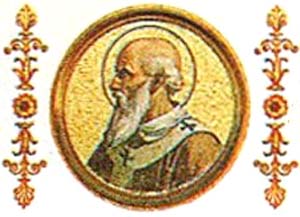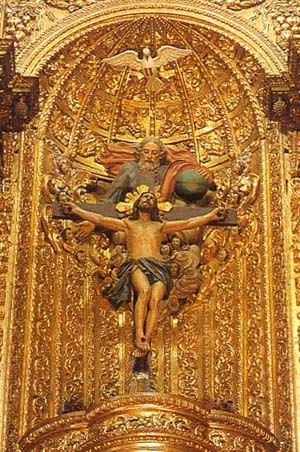 |
The Saint of the Day
Pope St. Leo II, July 3
Prof. Plinio Corrêa de Oliveira
Biographical selection:
St. Leo II (682-683), Pope and confessor, approved the documents of the Sixth Ecumenical Council (Third Council of Constantinople) which had been convened by Pope St. Agatho, his antecessor. That Council condemned the heresy of Monothelism, and namely condemned Pope Honorius who adhered to it. Regarding Pope Honorius, St. Leo II wrote that “instead of purifying this Apostolic Church, he permitted the immaculate to be maculated by a profane treason.”

St. Leo II condemned
Pope Honorius as a heretic
|
Pope Honorius wrote a letter to the heretic patriarch of Constantinople, Sergius, approving his thesis that Our Lord would have only one will or energy, and not two – the divine and human – and took a clear position against St. Sophronius, Patriarch of Jerusalem, who was attacking the heretic.
Monothelism was condemned by the successors of Pope Honorius: Pope Severinus (640-640) formally condemned it, Pope John IV (640-642) and Pope Theodore I (642-649) excommunicated Pyrrhus, patriarch of Constantinople, for defending the same error. Pope Martinus (649-655) was imprisoned by the Emperor Constans II, and died a martyr because he did not accept Monothelism. Pope Eugenius I (654-657) also rejected this doctrine. The Ecumenical Council of Constantinople (680-681) condemned Monothelism and Pope Honorius as a heretic. This condemnation was elaborated by Pope St. Agatho (678-681). The documents of this Council were ratified by Pope St. Leo II.
Referring to the defection of Pope Honorius and to Monothelism as a continuation of Monophysism, Dom Guéranger made this prayer to St. Leo II:
"What craft was displayed by Satan in this campaign prolonged for two centuries, noiselessly, the better to secure success. What exultation rang through the abyss when one sad day saw the representative of Him who is the essential Light appear to side for a moment with the powers of darkness! A cloud seemed to have come between Heaven and those mountains of God, where He dwells with His Vicar; it is probable that the social aid of intercession was weaker just then than it should have been.
"Be ever at hand, O Leo, to ward off all similarly dangerous situations. Uphold, in every age, the Pastor who rules Christ’s Church, that he may keep himself aloof from the darkening mists that earth exhales. Keep ever alive in the hearts of the faithful flock that strong prayer, which should continually be made without ceasing for him by the Church; and then Peter, were he even chained in the depths of the darkest dungeon, will be reached by the Sun of Justice and clearly see his way in the pure ray; then will the whole body of the Church be filled with light."
Comments of Prof. Plinio
You can see the magnificent choir of Popes condemning the heresy of Monothelism and avenging the honor of the Church. For the heretic present inside the Church sullies the Church that is immaculate.

The heresy of monothelism denied Jesus Christ had two wills, one human and one divine
|
This is the reason why the honor of the Church demands the exclusion of the heretic. There is no possible peaceful coexistence, no normal living together between good and evil, truth and error. This is not possible anywhere, moreover, within the Catholic Church, which is par excellence the sacred mountain of truth and goodness. She cannot bear within herself one who defends error and evil.
Someone could object that this is against the mercy of the Church.
I would answer that the Church has a great deal of mercy. It is why she does not exclude from her bosom the sinners who recognize their faults, beat their chests asking forgiveness, and desire to re-start a good life. But when someone stubbornly states that the evil is good and the error is truth, and strives to disseminate this evil, the Church has to exclude this person from her bosom with horror, first, because he leads souls who are inside the Church to perdition, and, second, because evil and error are in fundamental contradiction with her very nature.
Today one of the virtues that is missing is the holy intransigence that comes from a healthy Faith. If one has a faith that is alive, he cannot tolerate the opposite of what his faith states inside the Church. We should ask Our Lady to give us this sacred intransigence, which is a corollary of her immaculate purity. The same intransigence she had against impurity she had against heresy. We should ask her for this grace.
I make these comments in view of the circumstances of the life of St. Leo II. He approved the conclusions of the Sixth Ecumenical Council, which condemned the pope, who, according to the words of St. Leo II, “instead of purifying the Apostolic Church, permitted the immaculate to be maculated by a profane treason.” Pope Leo II affirmed this about his antecessor, Pope Honorius.
It was tremendously difficult for him to live in a time that had a bad Pope, who deserved the hard words he spoke and the condemnation of the Ecumenical Council of Constantinople. You can understand how difficult those times were in which he lived.
If some of you live in similar times, you should study the situation and ask St. Leo II to give you the intense fidelity to the Church and to the papacy that he had. It was this fidelity that made him, a saint and a Pope, deem he had the duty and the right to use the words he did against Pope Honorius.
Prof. Plinio made this commentary on July 3, 1965, during Vatican II.


  | | Prof. Plinio Corrêa de Oliveira | |
The Saint of the Day features highlights from the lives of saints based on comments made by the late Prof. Plinio Corrêa de Oliveira. Following the example of St. John Bosco who used to make similar talks for the boys of his College, each evening it was Prof. Plinio’s custom to make a short commentary on the lives of the next day’s saint in a meeting for youth in order to encourage them in the practice of virtue and love for the Catholic Church. TIA thought that its readers could profit from these valuable commentaries.
The texts of both the biographical data and the comments come from personal notes taken by Atila S. Guimarães from 1964 to 1995. Given the fact that the source is a personal notebook, it is possible that at times the biographic notes transcribed here will not rigorously follow the original text read by Prof. Plinio. The commentaries have also been adapted and translated for TIA’s site.
|
Saint of the Day | Home | Books | CDs | Search | Contact Us | Donate

© 2002- Tradition in Action, Inc. All Rights Reserved
|
 |

|